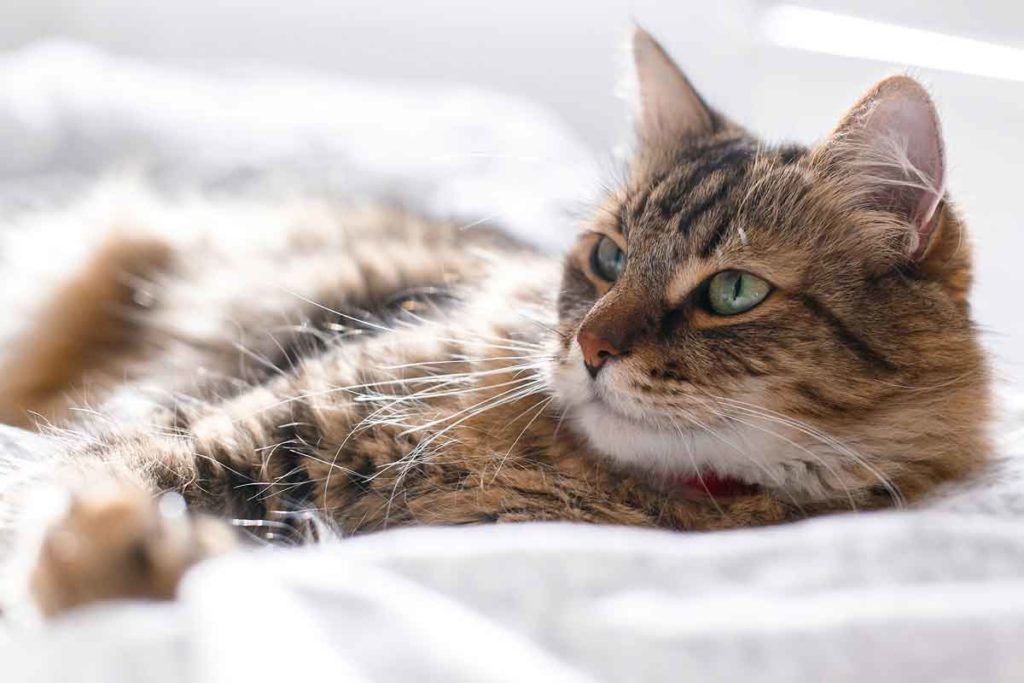Seasonal allergies have become synonymous with drugs like Benadryl. When we feel the itchy eyes, stuffy nose and sneezing start to intensify, Benadryl is there to help us through and minimize symptoms.
As we’ve learned, allergies are not just a human health issue. Our pets suffer as well, including our cats. And, as it turns out, Benadryl has been prescribed by veterinarians for years to address pet allergies, with cats benefiting greatly.
So, how does Benadryl work for cats?
Table of Contents
What is Benadryl?
Benadryl is one of many brand names of a drug called diphenhydramine. Diphenhydramine is an antihistamine medication. In cats and other small mammals, it is used mainly to treat allergies, allergic reactions, motion sickness, and can also be used as a mild sedative.
Benadryl’s use in cats is classified as “off-label”. This is extremely common in veterinary medicine, meaning the drug is being used for something it was not initially intended for (in this case, pet allergies). It will also mean that the dosing amounts and dosing structure will differ from what is listed on the product (in most cases). The reason being pets will normally weigh much less than their human counterparts and will metabolize drugs differently, among other biological differences. Listen and follow your veterinarians dosing recommendations closely.
You may be thinking, “I thought Benadryl was an over-the-counter medication?”. And for humans, it is. But for our pets, these medications are used and controlled a little differently. Your veterinarian will need to prescribe your cat Benadryl, you cannot just walk into your local CVS, Walgreens or Petco.
Common Uses for Benadryl in Cats:
- Allergies
- Allergic reactions
- Sedative
- Motion Sickness
Administration Methods
If you’re a fellow cat owner, deciding which treatment to try is the easy part. Getting your cat to take the medication…. is where the real battle can begin. Whereas dogs may be anxious to eat or take anything you present them, cats can be a little more sensitive to new tastes or odors. They also tend to be a little more intelligent than their canine companions, so it can be difficult to try and “trick” them into taking their medications.
With cats, Benadryl is given orally by way of capsule, tablet, or oral liquid. Unfortunately, the liquid carries with it an unsavory taste, making it difficult for cats to accept. For cats that simply will not accept Benadryl orally, there is also an injection available. Your veterinarian will need to complete this procedure, and the Benadryl will be injected in a vein, muscle, or under the skin.
Common Side Effects in Cats:
- Lethargy or Excitability
- Dry Mouth
- Urinary Retention
- Vomiting
- Diarrhea
- Appetite Suppression
These side effects are common for not only cats, but for dogs and humans as well. Most are not described as “serious” in nature, but they can still raise complications. Cats do experience a side effect that seems to be unique to their species, the side effect being excitability. While in most cases, Benadryl can cause feelings of lethargy and drowsiness, it can sometimes have the opposite effect in cats. The reason for this is not concretely known, but it is something to be aware of for cat owners. If you think your cat is showing signs of an adverse reaction or any of the side effects listed above, contact your veterinarian.
Drug Interactions
Benadryl is thought to be safe for cats, but there are some cautionary guidelines. Benadryl and other antihistamine medications should be used with caution in cats with glaucoma, intestinal obstruction, heart disease, elevated thyroid hormone, or high blood pressure. Benadryl should also be used with caution if your cat is currently taking any CNS depressants, such as sedatives and pain medications. To be sure, always consult your veterinarian before starting or stopping a medication like Benadryl and talk about any drugs or supplements your cat is currently taking.
Allergy Symptoms in Cats
If you’re thinking about trying Benadryl for your cat, first, it can be helpful to know what to look for as far as cat allergy symptoms. Check out our blog on Allergies in Cats!









